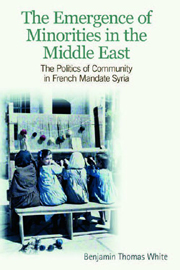Book contents
- Frontmatter
- Contents
- Map 1. Syria c.1936
- Map 2. The Far Northeast of Syria in the 1930s
- Outline Chronology of the French Mandate, 1919–39
- Acknowledgements
- Introduction
- Part I
- 1 Minorities, Majorities and the Nation-state
- 2 ‘Minorities’ and the French Mandate
- Part II
- Part III
- Conclusion: Minorities, Majorities and the Writing of History
- Select Bibliography
- Index
2 - ‘Minorities’ and the French Mandate
from Part I
Published online by Cambridge University Press: 12 September 2012
- Frontmatter
- Contents
- Map 1. Syria c.1936
- Map 2. The Far Northeast of Syria in the 1930s
- Outline Chronology of the French Mandate, 1919–39
- Acknowledgements
- Introduction
- Part I
- 1 Minorities, Majorities and the Nation-state
- 2 ‘Minorities’ and the French Mandate
- Part II
- Part III
- Conclusion: Minorities, Majorities and the Writing of History
- Select Bibliography
- Index
Summary
Introduction
The accusation of having mutilated Syrian unity … is laid against us by Arabizers who call themselves patriots and whose design is evident: adversaries of the mandate, what they want is an independent Syria where the 1,500,000 Muslims would subjugate the half-million Christians. If this state of affairs came about, it would not only be the end of western influence in the Orient: it would be the opening of an era of disorders and massacres. Greater Lebanon is a rampart against invasive panarabism and Islamic persecution. The institution of the mandate had precisely the aim of preventing, in the anarchic unchaining of fanaticisms, the most frightful religious war.
This extract from Robert de Beauplan's 1929 work Où va la Syrie? is fairly typical of French imperialist writings on Syria in the 1920s. Rejecting the notion of a territorially or socially unified Syria – ‘the Syrian nation is a myth’, Beauplan affirms elsewhere – it stresses the religious divisions within Syrian society and assumes a latent persecuting fanaticism on the part of Syria's Muslims. It justifies the French presence, and the administrative divisions France had imposed in the mandate territories, as the only thing standing between Syrian Christians and massacre. It cites the mandate in support of French rule. And, despite referring to the numerical inferiority of the Christians, it lacks any explicit reference to minorities.
This chapter places the emergence of ‘minorities’ in Syria in the context of the French mandate. It focuses on the interplay between two distinct factors: first, the policies the French put in place in Syria in order to structure, and exacerbate, the divisions between Syria’s diverse communities; and, second, and more profound in its effects, the transition to a nation-state form.
- Type
- Chapter
- Information
- The Emergence of Minorities in the Middle EastThe Politics of Community in French Mandate Syria, pp. 43 - 66Publisher: Edinburgh University PressPrint publication year: 2011



